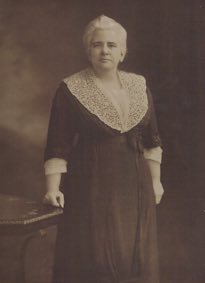Reverend Doctor Anna Howard Shaw, minister, physician, ardent feminist, and masterful orator, worked to improve individual morality through her ministry, tried to improve society by moving into the temperance and suffrage movements, and finally campaigned vigorously for the League of Nations to promote world peace.
Essentially self-taught, Shaw’s first career, to help support her family, was as a frontier school teacher. At the age of twelve Shaw had to assume the burden of the survival of her semi-invalid mother and her siblings.
After the Civil War, she was able to move into the home of a married sister and attend high school. She became active in the Methodist church, preaching her first sermon when she was twenty-three and becoming a licensed to preach a year later. In 1873, she entered Albion College, paying for her two years of education there by preaching and giving lectures on temperance. In 1876, she left Albion to attend Boston Theological Seminary. Upon graduation, in 1878, as the only woman in her class, she took charge of a church in East Dennis, Massachusetts, but the General Conference of the Methodist Episcopal Church refused her application for ordination because she was a woman. It also took steps to revoke her preaching license. Finally, in 1880, Shaw convinced the Methodist Protestant Church to grant her ordination so she could administer the sacraments and continue her ministry in East Dennis.
In addition to ministering at two churches, Shaw earned a medical degree from Boston University in 1886. However, she never practiced medicine. Instead, she resigned her pastorates in 1885 to take up the banners of temperance and women’s suffrage. From the 1880s until her death in 1919, Shaw worked at the grass roots level throughout the country to achieve women’s suffrage. For a few years she headed the Franchise Department of the Woman’s Christian Temperance Union. In 1904 she became president of the National American Woman Suffrage Association. During World War I, Shaw turned her attention to foreign affairs. She became chair of the Woman’s Committee of the United States Council of National Defense, coordinating women’s contributions to the war effort. For this work, in 1919 she became the first woman to earn the Distinguished Service Medal. At the end of the war, at the request of President Wilson and former President Taft, she lectured in the U.S. and Europe in support of world peace and the League of Nations. It was during one of those speaking tours that she fell ill and died in July, 1919, at the age of seventy-two.
While Shaw died just before the Women’s Suffrage Amendment was ratified, she fulfilled her vision of success: “Nothing bigger can come to a human being than to love a great cause more than life itself.”

